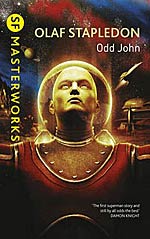
![]() couchtomoon
couchtomoon
6/24/2015
![]()
I've had bad luck with the childish space dramas of the 1930s but I've been promised by several good authorities that Olaf Stapledon is a special kind of 1930's SF writer. They weren't kidding.
Narrated by the adult friend of his father, we learn of the short life of "Odd" John Wainwright, a child born with many physical anomalies, such as a big head, spidery limbs, and mobility constraints, but whose rapid intellectual development convinces the narrator that John is Homo superior. John spends his infancy mastering mathematics, his early childhood analyzing individuals, and the rest of his brief life seeking enlightenment, purpose, and other Homo superior beings. As his telepathy skills improve, he connects with people like himself, and they set out to establish a private island community, away from the dangerous, brutish Homo sapiens society.
A philosopher by trade, Stapledon's tale is more thinkpiece than story of action, and he uses John's unique position as an advanced outsider to examine everything from war to economics to human morality. Chapters often delve into John's lengthy responses to the narrator's questions about his observations of the world. John's commentary is always clever, entertaining, and extremely self-aware and progressive, considering this commentary is actually coming from a White, male author of the 1930s. At the same time, Stapledon highlights many alarming aspects of the "superman" attitude.
John's superiority is not only the name of his advanced species, but also his attitude toward the lowly sapiens, including the narrator, whom he often calls "Fido." Whether it's a question of his reluctance to act as caretaker of the human race ("Chicken-farming is not worth such a sacrifice." Ch. X), or casual regard toward murder for the advancement of his own species ("So we decided to destroy them." Ch. XVIII), Stapledon's positions the narrative as a critical examination of national superiority at a time when eugenicist attitudes rampaged throughout Europe and the United States - though it's not nearly so heavy-handed to be the only ground covered. John is both a sympathetic and disturbing character.
Some food for thought:
On nationalism: "A nation, after all, is just a society for hating foreigners, a sort of super-hate-club" (ch. X).
On birds: "They do their simple jobs with so much more style than man shows in his complicated job" (ch. V).
On philosophy: "It's like one of those rubber 'bones' they give dogs to chew, damned good for the mind's teeth, but as food--no bloody good at all" (ch. V).
Call it SFilosophy, but there's plenty to chew on in this Inter-War contemplation of superiority and morality. And the audio version is highly recommended, just because there's just something special about having Olaf Stapledon at your ear.
http://couchtomoon.wordpress.com